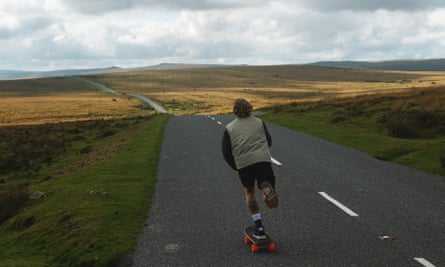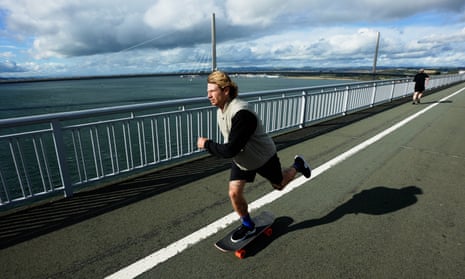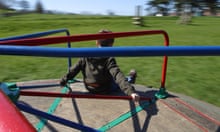Skateboarding may be more usually associated with riders refining their tricks in urban parks or cruising along sun-dappled beachside promenades. But the British professional skateboarder Barney Page went for something very different – a gruelling road trip of almost 1,000 miles from John o’Groats in Scotland to Land’s End in Cornwall.
A film detailing Page’s journey, called Land’s End, is being screened across Europe and North America, attracting plaudits not only for Page’s spirit of adventure but for the way it tackles the issue of mental health and suicide.
As well as describing the adventures, near collisions and strength-sapping climbs, the 80-minute movie tells the story of Page’s friend Ben Raemers, another professional skateboarder, who killed himself aged 28 in 2019.
Page, 32, trained for the trip by riding alongside the river in his home city of Exeter and taking boxing classes to toughen up. He began the journey with a trick called a “nollie flip” but he did not have much spare energy for many other stunts.
“It was tough on the body, quite a strenuous things to be doing, but I had my friends with me,” he said.
Page was supported – and protected from the traffic – by a van staffed by a driver and navigator and accompanied by the film-maker Ryan Sherman and a photographer.
They tried to stay off the busiest roads but there were near misses. “The most dangerous part was when you came across a driver without a lot of patience, especially around 5pm when they’re trying to get home,” Page said. “People would be abusive sometimes, effing and blinding at you. That could bring the morale down but the majority of people were supportive.”
When he felt he was struggling to keep going, he would imagine Raemers laughing at him and carry on. The Scottish Highlands were the hardest physically. “There are a lot of hills but the beauty is incredible. The Midlands was more boring but good that it was flat, and when we hit Devon and Cornwall it was magnificent again.
“It was definitely an adventure, winding through the country. It was a beautiful way to see the country piece by piece, a chance to explore the UK in a unique way.”

Touring the film around is another adventure. It will eventually be available to be streamed but for the moment the communal screenings are leading to conversations about mental health.
“I tragically lost a friend,” Page said. “It opened a lot of people’s eyes in the skate community. Creating that awareness is a very important thing. Lots of people open after watching the film. It helps create a safe space.”
There was sellout screening in Exeter last week and a second screening is taking place at a larger venue in the city on 1 November.
That screening, which will include a Q&A, is part of a festival of social science and organised by Paul O’Connor, of the University of Exeter, who researches the lives of skateboarders and the impact of the sport on society.
O’Connor described the film as “bittersweet”. “There is a lot of joy in the film. Barney is a remarkable ambassador for the joy of life. But it talks seriously about young men’s, and more generally everyone’s, mental health,” he said.
“Skateboarding is really progressive in terms of inclusivity, sexual orientation, gender identity. It’s way ahead of other sports because it’s a community, a lifestyle, a philosophy. Skateboarders are really good at trying to fix things that are problematic.
“Barney and Ryan want to use the film as a springboard for more people to have these conversations, to check in with each other, ask difficult questions.”









